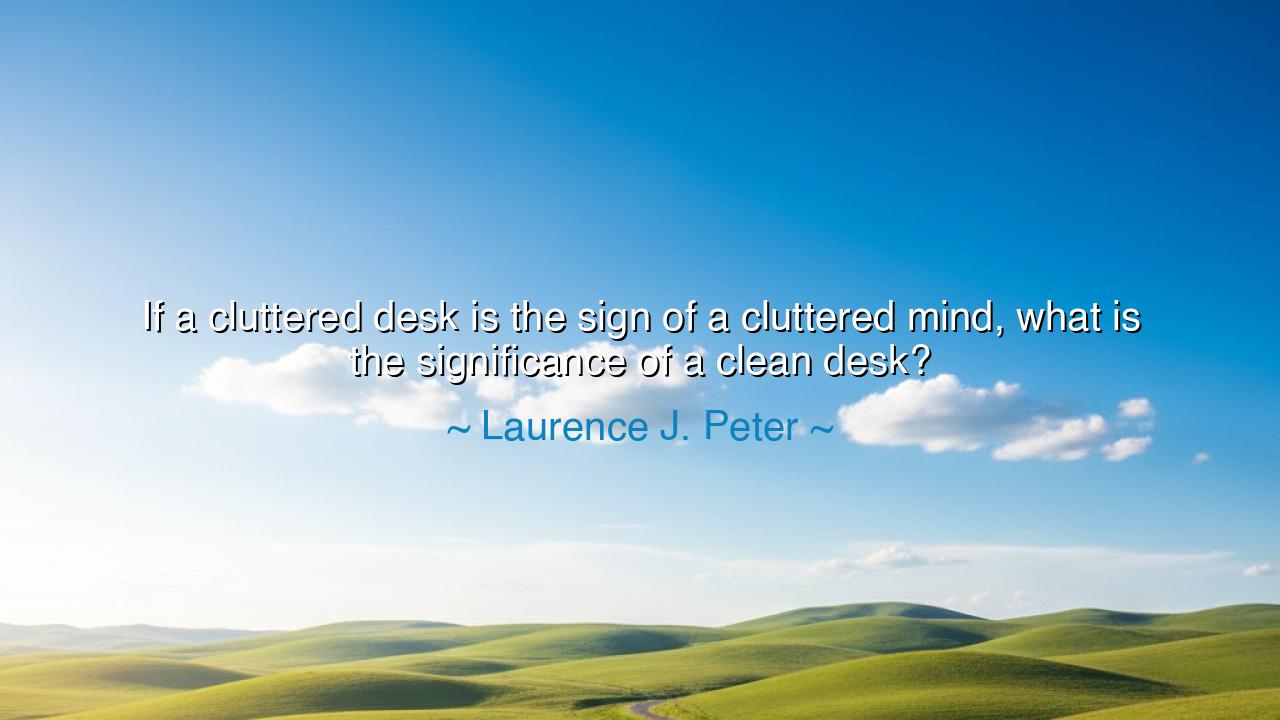
If a cluttered desk is the sign of a cluttered mind, what is the
If a cluttered desk is the sign of a cluttered mind, what is the significance of a clean desk?






Hear this, O future seeker of wisdom, and heed the words of Laurence J. Peter, who spoke thus: "If a cluttered desk is the sign of a cluttered mind, what is the significance of a clean desk?" In these words, Peter has cast a powerful light upon the nature of order and chaos, upon the very core of human thought and the external world that reflects it. Clutter, which may seem to many as a mere disarray of objects, is not a trivial matter; it is a profound symbol of the inner workings of the mind. To see a desk in disarray is to glimpse the storm within a person’s spirit, a tempest of ideas and thoughts swirling without yet finding peace.
In ancient times, the great philosophers pondered deeply on the nature of order and chaos. Socrates, in his wisdom, might have considered the nature of one's surroundings as a mirror to the soul. The mind, he said, is akin to a garden—without care, weeds of confusion will overrun it, but with discipline and focus, the garden may flourish with clarity. Thus, the cluttered desk is not merely a physical mess, but a symbol of a mind in turmoil, filled with unprocessed thoughts and uncompleted tasks. The scattered papers, the unread books, and the forgotten reminders are not mere distractions; they are the echoes of a mind at war, striving to reconcile the chaos of ideas into something meaningful.
But what of the clean desk, the ordered space where every item has its place and every thought seems to rest neatly in its corner? The ancients knew that order can be a symbol not just of physical cleanliness but of mental discipline. A clean desk, then, is not necessarily a sign of a clear mind—for clarity is a much more elusive thing—but perhaps a mind that has reached some measure of peace. For a clean desk may not only represent an ordered physical space but also a mind that is capable of focusing, capable of gathering ideas without the distraction of chaos. Is it a mind at ease, or simply one that has not yet begun to wrestle with the complexities of the world?
Think of the story of Leonardo da Vinci, whose own desk, though messy by many standards, was a reflection of his genius at work. His mind, as cluttered as his workspace, constantly danced between ideas, thoughts, and inventions that defied time. Yet, in his chaotic environment, there was profound order—an order of purpose, of creativity, and of the mind working tirelessly toward perfection. So, too, might we wonder whether the clean desk truly represents clarity or whether it is an illusion, a pristine shell that hides the deeper, messier work of the human spirit.
Yet, there is another view, a cautionary one. The mind, as ancient wisdom tells us, is not an empty vessel to be filled; it is a force that shapes itself. When a desk is too clean, too perfect, we might ask whether it is a sign of a mind that avoids the true work of life. Perhaps it is not the chaos of clutter that speaks to an unsettled soul, but the fear of engagement, the desire to hide from the inevitable messiness of existence. A perfectly clean desk might signify a mind unwilling to embrace the fullness of life, afraid of the disorder that accompanies real thought, real creation, and real progress.
Take heed, then, for the lesson is not merely to judge one's environment by the appearance of order or chaos, but to understand the deeper truths that each symbol reveals about one's inner state. In this world, where the mind can become easily overwhelmed by the demands of daily life, a cluttered desk may speak of a mind that is actively engaged, fighting to make sense of the world. But it may also speak of a mind that has become disorganized, pulled in too many directions without the discipline to focus. And the clean desk, while perhaps an outward symbol of order, may signal a mind that has simply not yet begun to confront the deeper, more complex work of life.
So, what shall we do? Let us learn from the clutter and the cleanliness alike. Let us not dismiss the chaos of a desk in disarray, for in it, there may be the seeds of creativity, waiting to find order. Nor should we idolize the clean desk, for it may be hiding a mind that has not yet dared to confront the depth of its own being. Instead, we must strive for a balance—a mind that is disciplined enough to embrace both the clutter of thought and the clarity of purpose. Let us engage with the messiness of life, for it is in the clutter that we find our true selves, and in time, through effort and wisdom, we will learn to organize our thoughts into something that serves not only ourselves but the greater world.
May we remember, then, that both the cluttered desk and the clean desk are not ends in themselves, but symbols of the constant work of the mind, a journey towards greater clarity and purpose. Keep your workspace in whatever way serves your higher purpose, and seek always to cultivate the inner order that will lead you through the storm and into the light.






AAdministratorAdministrator
Welcome, honored guests. Please leave a comment, we will respond soon